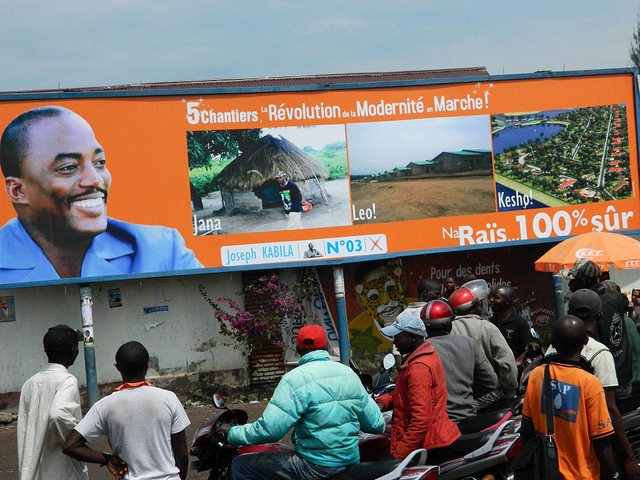
In a shocking phone interview broadcast by Congo’s RLTV television station on November 6, the presidential candidate for the Union for Democracy and Social Progress, or UDPS, Etienne Tshisekedi declared himself president. Speaking from South Africa where he has been drumming up support for his opposition party Tshisekedi said:
As I said, we don’t need to wait for the elections. In a democracy, whoever has the power is the majority of the people. And the people of Congo, in its majority have chosen and trust Tshisekedi. Therefore, from this day on I am the Head of State of the DRC.
He also called for a mass jailbreak of political prisoners, particularly those jailed for supporting the UDPS. Observers have noticed there may be a political objective to Tshisekedi’s strange and controversial statement; yet, his strategy may result in unexpected and unwanted consequences for UPDS and other opposition parties.
His inflammatory statement appears to play into the hands of the ruling party. Prior to Sunday’s interview aired on an opposition-leaning TV station, Congolese authorities had embarked on a broad and concerted effort to limit media access for Kabila’s opponents. Tshisekedi’s statement, characterized as treasonous, now provides cover to pro-Kabila officials already engaged in sustained acts of censorship and repression.
A U.N. report released yesterday highlighted the widespread repression of independent media sources, journalists, and opposition supporters by government forces. It also noted a worrying trend of state manipulation of the police force and the judicial system to the benefit of the ruling party.
Reporters Without Borders and their Congolese partner organization Journaliste en Danger wrote an open letter to the Interior Minister, Adolphe Lumanu Mulenda Bwana N'Sefu highlighting recent attacks on television, radio, and print media outlets and urging the government to uphold the ideals of freedom of the press and protection of journalists. Additionally, Congolese rights groups identify pro-Kabila security forces as responsible for the increased level of violence and intimidation in the pre-election period.
Tshisekedi’s comments were undoubtedly inflammatory and controversial but they now provide ample justification for Congolese authorities to continue their campaign of repression and censorship of pro-opposition media.
The justice ministry has started an investigation of Tshisekedi's "treasonous" remark. As part of the inquiry the government has closed down RLTV, the stationed which aired Tshisekedi’s interview. In a statement condemning the opposition leader’s comments, Information Minister Lambert Mende said, “We gave the case to the Justice [Ministry] and to the regulatory authority to decide whether this station can be allowed to continue [broadcasting] because we are not ready to experience a name-calling radio here in Congo after what Rwandese experienced in 1994.”
Mende justified the station closure as a preventative action and explicitly linked the outlet with the now infamous Rwandan broadcaster Radio Milles Collines, an organization implicated in the 1994 genocide. The reference to Radio Milles Collines is intentional and palpable – it justifies censorship and media blockades by painting the Congolese government as guarding against hate speech, while ignoring the documented human rights abuses on the part of pro-Kabila actors seen in the run up to the November 28 elections.
While reactions to opposition candidate Etienne Tshisekedi’s presidential self-declaration have ranged from disbelief to bemusement, the UDPS leader’s statements will have a profound effect on the pre-electoral climate during these final weeks. Few Congolese took his call for mass jailbreaks seriously but his near treasonous comments have given the governing party a tailor-made excuse to continue their campaign of censorship and solidify their near monopoly on Congolese media outlets.
Photo: Kabila campaign billboard in Goma (Enough/Fidel Bafilemba)

